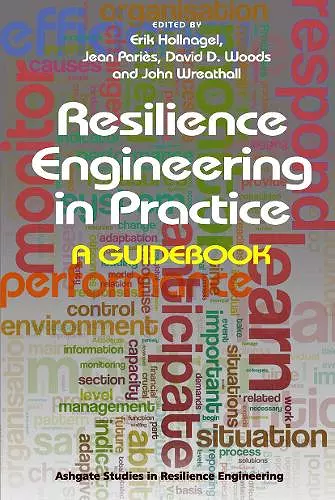Resilience Engineering in Practice
A Guidebook
Jean Pariès author John Wreathall author Erik Hollnagel editor
Format:Paperback
Publisher:Taylor & Francis Ltd
Published:1st Nov '13
Currently unavailable, and unfortunately no date known when it will be back
This paperback is available in another edition too:
- Hardback£165.00(9781409410355)

Resilience engineering has since 2004 attracted widespread interest from industry as well as academia. Practitioners from various fields, such as aviation and air traffic management, patient safety, off-shore exploration and production, have quickly realised the potential of resilience engineering and have became early adopters. The continued development of resilience engineering has focused on four abilities that are essential for resilience. These are the ability a) to respond to what happens, b) to monitor critical developments, c) to anticipate future threats and opportunities, and d) to learn from past experience - successes as well as failures. Working with the four abilities provides a structured way of analysing problems and issues, as well as of proposing practical solutions (concepts, tools, and methods). This book is divided into four main sections which describe issues relating to each of the four abilities. The chapters in each section emphasise practical ways of engineering resilience and feature case studies and real applications. The text is written to be easily accessible for readers who are more interested in solutions than in research, but will also be of interest to the latter group.
'Although risk management has brought greater safety to socio-technical systems, a new approach is still strongly needed. Erik Hollnagel's excellent book offers the right approach; that resilient behaviour by people leads to stable systems. Those searching for a more profound understanding of system safety must read this book as it is a practical guide to this new approach.' Akinori Komatsubara, Waseda University, Japan 'With crises abounding, the concept of resilience is more relevant than ever. Manifold examples from a variety of high-risk industries provide insights into the four basic requirements for resilience: responding, monitoring, anticipating, and learning. Tools are presented that support the assessment of these requirements as well as their promotion, be it by training emergency management, handling fatigue of system operators, supporting preventive maintenance, providing better rules for managing conflicting goals, or improving incident reporting. The book, by Erik Hollnagel and his colleagues, will be a great resource for system designers and decision-makers in organizations in their endeavours to keep the uncertainties and complexities of our world at bay.' Gudela Grote, ETH Zürich, Switzerland 'Be prepared to be unprepared. How do you do that? By absorbing the evocative data, nuanced terminology, sustained guidance, and broad applications summarized here. Resilience is about more than engineering as becomes clear in these descriptions of the actual, critical, potential, and factual events that unfold when disturbances fall outside the operational envelope. Resilience engineering is a hot topic. Here is the one book that shows you why!' Karl E. Weick, University of Michigan, USA 'The book is very practical in the sense that only relevant and significant theories or frameworks are discussed followed by extensive descriptions of the situations on the field. Solution-seekers are the group of readers who will benefit the most from readin
ISBN: 9781472420749
Dimensions: unknown
Weight: 657g
362 pages